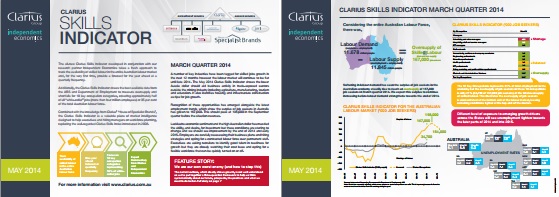Clarius report highlights future skilled jobs growth areas in tepid Australian market
THE bad news is that the labour market will remain flat to year-end. The good news is that a number of key industries are showing skilled jobs growth in the next 12 months. Those were some of the findings in the latest Clarius Skills Indicator released by Asia-Pacific employment services specialist Clarius Group on May 6. 
This latest Clarius Skills Indicator shows the lower Australian dollar should aid business activity in trade-exposed sectors outside the mining industry including agriculture, manufacturing, tourism and education. It also identifies housing and infrastructure construction as ripe for job growth.
The recognition of these opportunities has emerged alongside the latest employment trends which show the surplus of job seekers in Australia has grown to 167,000. This should peak at 198,000 in the September quarter before the situation reverses.
The Clarius Skills Indicator, produced in conjunction with Independent Economics and based on ABS, Department of Employment and Clarius Group recruitment data, tracks the availability of skilled labour in the entire Australian labour market and provides a forecast for the year ahead.
Clarius Group (ASX: CND) CEO Kym Quick said employers were carefully reassessing their business plans and hiring strategies and opting for a contracted labour force over permanent staff.
“Executives are asking recruiters to identify good talent in readiness for growth but they’re watching their cost base closely and opting for a flexible workforce that can quickly be turned on or off,” Ms Quick said.
“The Australian dollar depreciated from around US$1.10 in the middle of 2011 to around US$0.93 in April 2014 and the flow on effect should be strong labour demand in sectors such as manufacturing and tourism that have suffered in recent years.
“The effect of the lower dollar should be boosted by the trade agreements with Korea and Japan.”
Major findings of the Clarius Indicator across the professions were:
- Managers in sales and marketing are the winners with a shortage of 500 skilled people, specifically with digital skills, as business transitions to web based retail.
- With the transition of mining – from investment to exports – the oversupply of engineers grew from a surplus of 3,700 people in the December quarter 2013 to 4,100 in the March quarter 2014.
- Fortunes fluctuate for ICT professionals. In the March quarter, the surplus grew to 1,800 up from a December quarter 2013 surplus of 1,200 and a September quarter 2013 surplus of 1,500 surplus. Clarius reported an uptick in demand for project managers signalling works are commencing.
- A June quarter 2013 surplus of 800 accountants, auditors and company secretaries doubled to 1,600 in the March quarter of 2014.
Ms Quick said the economy was experiencing a gap in labour demand because the mining boom – a major source of labour – has peaked and passed and new economic drivers have not yet kicked in.
“Lacklustre economic sentiment and the high Australian dollar has muzzled the ability, and desire, for investment but these conditions are starting to change and we should see improvement by the end of 2014 and early 2015,” she said.
The Indicator revealed the engineering market would tighten as new mines become operational. A decade long drought in housing is set to reverse in coming years – and with low interest rates, this sector is primed for employment growth. The ICT market is asking for project managers, signalling projects are moving.
The Clarius Skills Indicator showed the job surplus was more prevalent among lower skilled workers.
Ms Quick said the economy was now poised on the outcomes of the Federal Budget.
10 WORKPLACE TRENDS
The Clarius Skills Indicator has also identified 10 key workplace trends that have largely come about because Australian business has a keen eye on productivity gains as a result of the market has been flat. Consumers are saving, not spending.
- Business is closely managing its cost base. Companies are preferring contractors over permanent hiring so their workforce is flexible and can be turned on or off quickly.
- Business is scrutinising its productivity, right to the individual, before more staff are put on.
- When it comes to making permanent appointments, business is in no hurry. What may once have been a six week process, may now take three months or more.
- Candidates are staying in safe, existing roles rather than venture onto the job market. On one hand there’s a perception by business that there’s an abundance of people on the market. The reality is that a lot of the high performers are staying put.
- People are being asked to multi-skill and fill gaps left by retrenched staff.
- Loyalty is gone in the workforce given the amount of change and retrenchment that’s occurred.
- Flexible working arrangements are becoming entrenched where in some sectors people have been asked to reduce their hours to manage costs.
- Overtime is being closely monitored, and business is exhausting its leave liability.
- Big decisions are being delayed until tax and structural paradigms are understood which is placing more pressure on an already flat labour market.
- It’s been a market of high change but very low churn.
A complete version of the latest Clarius Skills Indicator can be found at http://www.clarius.com.au/media/clarius/clairus%20skills%20indicator%20may%202014.pdf
ends

 How to resolve AdBlock issue?
How to resolve AdBlock issue?  AUSTRALIAN Industry Minister, Ian Macfarlane chaired the inaugural meeting of the Council of Australian Governments (COAG) Industry and Skills Council in Brisbane on April 3, attended by state and territory ministers.
AUSTRALIAN Industry Minister, Ian Macfarlane chaired the inaugural meeting of the Council of Australian Governments (COAG) Industry and Skills Council in Brisbane on April 3, attended by state and territory ministers. CONSTRUCTION Skills Queensland (CSQ), the state’s industry leader for construction training, is changing its engagement model with industry to build what it calls a “cutting edge workforce for the next era in the state’s construction activity”.
CONSTRUCTION Skills Queensland (CSQ), the state’s industry leader for construction training, is changing its engagement model with industry to build what it calls a “cutting edge workforce for the next era in the state’s construction activity”.  BUSINESS leaders Australia-wide are meeting the challenges of tough times through creative pay structures that reward performance and help to retain vital staff.
BUSINESS leaders Australia-wide are meeting the challenges of tough times through creative pay structures that reward performance and help to retain vital staff.

